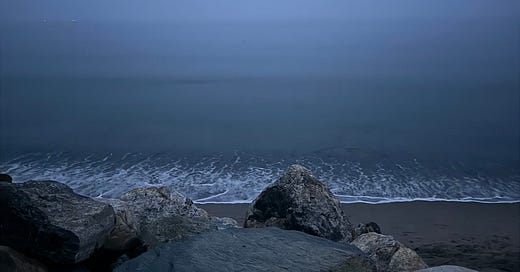“I have done nothing all summer but wait for myself to be myself again,” wrote Georgia O’Keeffe to fellow painter Russell Vernon Hunter from her desert hermitage in 1932.
I am writing to you today from a cottage along the rugged coast of New England. This is the kind of salt-cured day I often dream about from the desert. The atmosphere is low and thickly layered, daylight fused with a deeper blue now as we arrive at the far fringe of summer. Black-headed gulls and egrets convene as the tide recedes, and a soft fog absorbs every sound but the rolling hush of morning waves. A steaming mug keeps rhythm with the tick of a wall-mounted clock, and occasional keystrokes move across the page.
My family gathers here every summer. This is the cove where my stepmother dug among wet rocks for mussels and crabs with her many siblings and where, as teenagers, we built beach bonfires and popped firecrackers into the night sky. It is where my children set up their first lemonade stand with cousins and learned how to serenade periwinkles from their shells. This summer, a humpback whale made headlines when, mid-breach, it pitched its long body onto a boat, tossing a few local fishermen into the harbor.
But salty quietude is the balm of this place today. Midway between the summer solstice and autumn equinox, August’s Lughnasadh marks the beginning of the harvest in the Celtic tradition. It signifies an annual maturation — when boughs become fruit-laden and afternoons swell, sometimes bursting into rainstorms, before tapering into early evenings.
What is maturation? The word comes from Latin, mātūrāre, meaning “to grow ripe.” Perhaps it is simply to slow down and stay with a gradual, faithful revealing — to allow the flavor of a thing to emerge in its own time. There is no need to push now. The seeds have already been planted; the earnest prayers of earlier days have ripened into well-earned meaning.
In 2021, actress, screenwriter, director, and producer Michaela Coel became the first Black woman to be awarded an Emmy in the Writing for a Limited Series category for HBO’s extraordinary “I May Destroy You.” When she took the stage, she unfolded a small piece of paper and read:
"I just wrote a little something for writers, really: Write the tale that scares you, that makes you feel uncertain, that isn't comfortable. I dare you. In a world that entices us to browse through the lives of others to help us better determine how we feel about ourselves, and to, in turn, feel the need to be constantly visible – for visibility these days seems to somehow equate to success – do not be afraid to disappear from it, from us, for a while, and see what comes to you in the silence."
A balance point exists here between the seasons. Through the window and across several miles of moving water, my gaze drifts toward the Isles of Shoals—a cluster of barely inhabited islands along an unseen maritime border between New Hampshire and Maine. My mind hovers in midair—in the middle distance. I napped yesterday, perhaps for the first time in years. Upon waking, I sensed that something had happened in the depths — an indistinct but meaningful remembrance.
In the poem “You Can’t Have It All,” Barbara Ras writes “…and when it is August, you can have it August and abundantly so.”
The fringe of summer welcomes us to sip and sift and soften into ampleness. You can let yourself have it. The world may not even notice, and if it does, you can simply explain how you’ve been waiting to receive what is yours from silence.
My daughter hauls a bucket of saltwater from the beach below. She has the fine idea of boiling an egg in it. My father, her grandfather, gamely eats every bite — and then reports that it is the best damn egg he ever tasted.
- - -
Together, we are making sense of being human in an era of radical change. Your presence here matters. Thank you for reading, sharing, ‘heart’ing, commenting, and subscribing to The Guest House.





